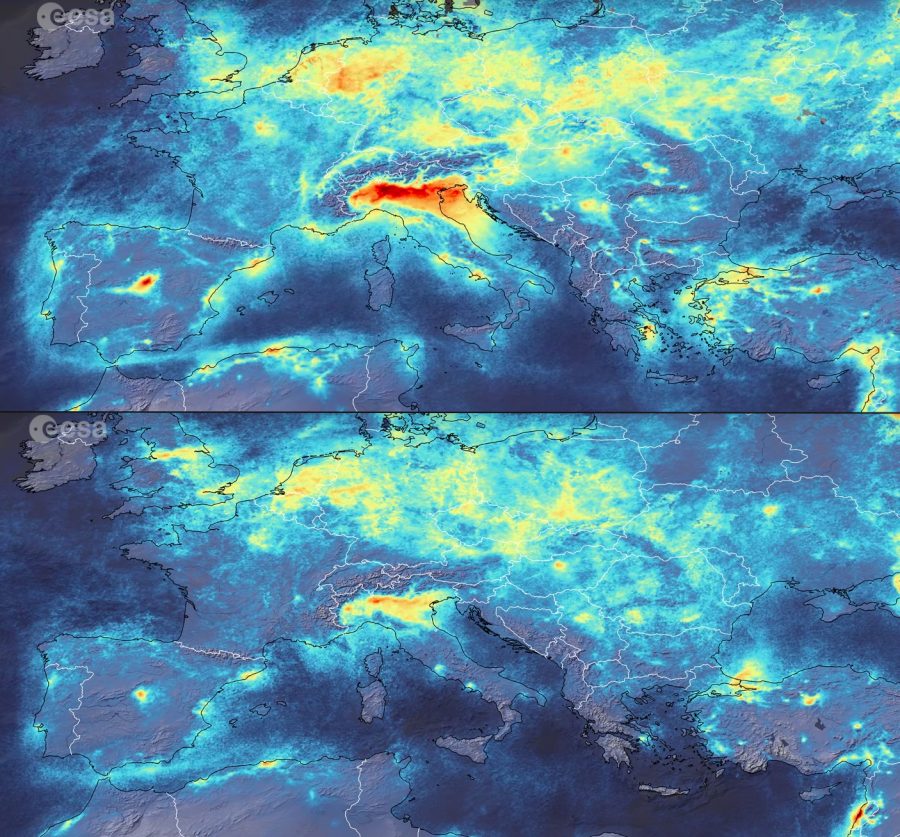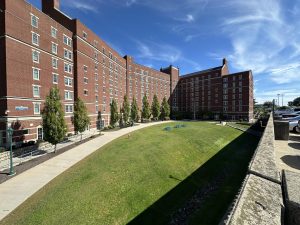Is The Coronavirus Showing Us The Path To A Better Economy?
ESA’s Copernicus Sentinel-5P satellite shows the decrease of NO2 levels across Europe from Jan. 1 to March 11, 2020.
April 2, 2020
The environment has greatly benefitted from the forced quarantine and lockdown in the majority of countries around the world, drawing attention to the impact the human race has on recent environmental concerns.
The water on the Venice canals is clear for the first time in years, showing the fish swimming underneath. Japan has seen deer, usually found in parks, roaming out onto the streets. Spain has welcomed peacocks and wild pigs on the empty roads once occupied by cars.
“Nature is sending us a message,” Inger Andersen, the United Nations’ (UN) environment chief, said.
She identified COVID-19 as a “clear warning shot” from nature that humans are doing something wrong and that authorities should consider a long-term strategy in order to prevent another infectious disease outbreak.
“We are intimately interconnected with nature, whether we like it or not,” Andersen said. “If we don’t take care of nature, we can’t take care of ourselves.”
Unexpectedly, the social distancing and the quarantine brought a collateral benefit for the environment. Due to quarantine, there has been a huge drop in tourism and in economic activity, such as less people going to work and driving, as well as factories and industries shutting down. This translated to a remarkably decrease of the world’s pollution.
Data processed by the Sentinel-5P satellite shows that, over the last month and a half, the levels of nitrogen dioxide (NO2), which forms from cars, power plants, trucks and buses, are considerably lower compared to last year’s numbers. This is specifically seen over cities and parts of the United States, Europe and Asia.
CarbonBrief, a British website specialized on climate, reported that during the quarantined period China reduced their carbon dioxide (CO2) emissions by a quarter.
Professor Róisín Commane, who carried out the New York air monitoring work, claimed that the number of carbon monoxide (CO) was “less than half of what we normally see in March,” making it the “cleanest” he has ever seen it.
A couple of weeks ago, the UN General Secretary Antonio Guterres stated “the climate change is deadlier than the coronavirus.”
The Worldometer has reported approximately 42,000 deaths related to coronavirus. According to the World Health Organization, the climate change will cause 250,000 deaths between 2030 and 2050.
Along with that, the International Organization for Migration (IOM) reported that 18 million people were forced to leave their homes in 2017 for environmental reasons, specifically related to the climate change.
Even though Guterres has now called for a global ceasefire to focus on “the true fight of our lives,” COVID-19, and has put aside the climate change crisis, he believes that the real choice will come after this.
“The recovery from the COVID-19 crisis must lead to a different economy,” he said. “Everything we do during and after this crisis must be with a strong focus on building more equal, inclusive and sustainable economies and societies that are more resilient in the face of pandemics, climate change, and the many other global challenges we face.”
Now it is up to society, the human race, to decide how to react and what to learn from this crisis.




